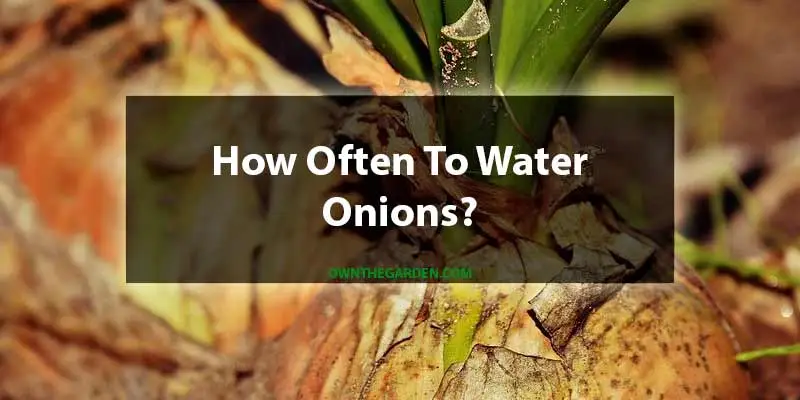Onions, like other root vegetables, need water to grow. If they don’t get enough water, they will not develop correctly and you’ll end up with misshapen onions or no onions at all. Onions are grown from seedlings and transplants in the spring. The onion plants should be watered regularly until they reach maturity in late summer or early fall.
How Often to Water Onions?
Onions should be watered every day during hot weather and every other day when it’s cooler. If you live in an area with very sandy soil, you may need to water them twice a day during hot weather.
If you live in an area where there is little rain during the growing season, it’s best to water your onions when needed rather than waiting until they show signs of wilting. This will prevent them from getting stressed out and losing leaves prematurely as well as prevent them from getting root rot or other diseases caused by too much moisture around their roots.
When Do You Water Onions?
The best time to water onions is early in the morning before temperatures get too hot during the day or after sunset when temperatures begin to cool down at night.
If you don’t water them early enough, they may wilt under direct sunlight; if you water them too late in the evening.
When watering onions, it’s important to remember that the soil should be kept moist but not soggy. The best way to check the soil moisture level is by digging a finger deep into the soil and feeling for moisture. If it feels dry and crumbly, then it’s time for some water. If it feels soft and spongy, then your onions have enough moisture for now but will need more later on when temperatures rise during the day and fall at night.
How To Tell It’s Time to Water Your Onions
Onions need regular watering to remain healthy and produce well. While it’s easy to tell when most plants need water, onions are different because they store water in their bulbs, which makes them harder to gauge.
Fortunately, there are some simple tricks that will help you tell when your onions need watering.
Look at the Leaves
Your onion’s leaves should be green with no signs of wilting or yellowing. If they start turning yellow or brown, it’s time for some water!
Check the Bulbs
The easiest way to check if your onions need water is by looking at their bulbs. A bulb that has gone soft indicates that it needs watering; this happens when there isn’t enough moisture in the soil around it. You can also use your finger to check how firm an onion feels – if it’s soft on the outside but hard inside, then it needs watering.
How to Water Onions
The most important thing to remember when watering onions is that they are not like other plants. Onions have a very shallow root system, which means that they need to be watered frequently and consistently. If you don’t water them on a regular basis, they will suffer from dehydration and die.
There are several methods for watering onions that I have used, but my favorite is using an automatic drip irrigation system. This method provides the most water when it is needed and keeps the soil moist all day long.
Another method is to use soaker hoses or drip lines attached to stakes or tomato cages placed around the plants. This method works well if your soil stays moist all day long. You don’t want to water too early in the morning because this will give bacteria a chance to grow in your garden bed before you get out there and harvest your crop!
The last method is to hand water with a hose or bucket every day or two during the growing season. This works fine if you live in an area where the soil stays moist all day long but isn’t practical for everyone living in areas where it gets really hot during the day and dry at night (especially if you have more than one row of onions).
Signs of Excessive Onions Watering
Onions planted in water can be a great way to get a head start on the growing season, as well as help you avoid transplant shock. But if you notice your onions are looking a little limp and wet, it might be an indication that you’re watering them too much.
Here are some signs that your onions may need less water:
The leaves are wilted. This is one of the most obvious signs of excessive watering. If you notice that the leaves are wilting or turning yellow, then it’s likely that they’ve been getting too much water over time. You should check your soil to see if it is still moist or if it needs more water.
The onion bulbs are soft. If you have planted your onions in water, then they should be placed in a container where they can get plenty of sunlight and air circulation, but without having their roots exposed to direct sunlight or wind damage. This helps prevent the onion bulbs from becoming soft and rotting before they’re ready for harvest.
Final Thoughts
Onions need to be watered regularly and thoroughly. The exact amount of water that is needed will depend on the variety of onions you are growing and the weather conditions. Onions should be watered at least once a week, but if it’s hot and dry they may need more frequent watering.


